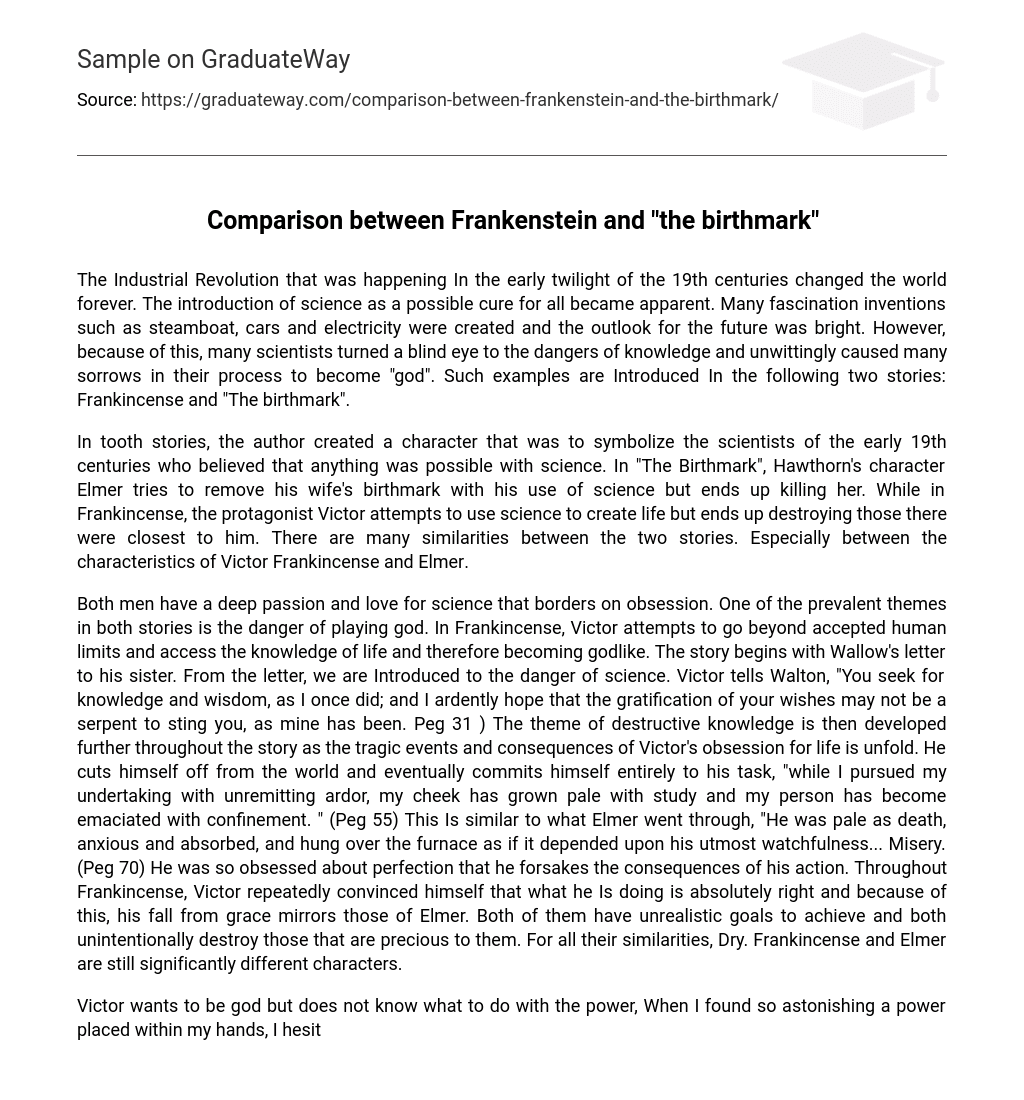The Industrial Revolution in the early 19th century had a profound and lasting impact on the world, highlighting the power of science and its ability to address various issues. This period witnessed remarkable inventions like steamboats, cars, and electricity that instilled hope for a promising future. Nevertheless, some scientists unintentionally overlooked potential hazards in their quest for god-like knowledge, inadvertently leading to considerable sorrow. The narratives of Frankenstein and “The Birthmark” offer notable illustrations of these repercussions.
The author of the tooth stories introduced a character that represents the scientists of the early 19th century who believed in the limitless possibilities of science. In “The Birthmark”, Elmer, a character created by Hawthorn, tries to eliminate his wife’s birthmark using scientific methods. However, his efforts result in her death. Similarly, in Frankincense, the protagonist Victor also employs science to bring life into existence but inadvertently destroys those who were dearest to him. The two stories share numerous similarities, particularly in the traits exhibited by Victor Frankincense and Elmer.
Both men in the stories have a strong passion and love for science that borders on obsession. One prevalent theme in both narratives is the peril of playing a god-like role. In Frankenstein, Victor attempts to surpass human limits and attain knowledge of life, thereby becoming godlike. The story commences with Walton’s letter to his sister, illustrating the dangers associated with science. Victor warns Walton, “You seek for knowledge and wisdom, as I once did;and I ardently hope that the gratification of your wishes may not be a serpent to sting you, as mine has been.” (Peg 31). The theme of destructive knowledge is further developed throughout the narrative as the tragic events and consequences of Victor’s obsession unfold. Victor isolates himself from society and dedicates himself entirely to his pursuit, stating, “while I pursued my undertaking with unremitting ardor, my cheek has grown pale with study and my person has become emaciated with confinement” (Peg 55). Elmer undergoes a similar experience, as he is described as “pale as death, anxious and absorbed,” obsessing over perfection and neglecting the consequences of his actions. Throughout Frankenstein, Victor repeatedly convinces himself that his actions are justified, which ultimately leads to his downfall mirroring Elmer’s.Both Dry.Frankincense and Elmer share unrealistic goals and inadvertently harm those dear to them. However, despite their similarities, these two characters, Dry.Frankincense and Elmer, remain distinct from each other.
Victor desires to possess god-like power but is unsure of how to wield it. When I discovered such an incredible power in my hands, I hesitated for a long time, pondering the path to new knowledge: “In other studies you go as far as others have gone before you… But in scientific pursuit, there is continual food for discovery and wonder” (Peg 52). Elmer, on the other hand, sees science as a means to obtain greater power: “We know Elmer possessed this degree of faith in man’s ultimate control over nature” (Peg 59). He attempts to play god in order to manipulate nature’s laws and perfect imperfections: “I feel fully capable of perfecting this beloved face… Then, my dearest, what a triumph it will be when I have corrected what Nature left incomplete in her most beautiful creation!” (Peg 63). In the end, however, nature has the last laugh when the potion Elmer gives Georgian leads to her death. Both Frankincense and Elmer fall victim to their destructive fascination with science and nature. Both men strive for godhood and ultimately fail. Perhaps that is why both Shelley and Hawthorne wrote similar stories, attempting to illustrate the danger of ambition, science, and the desire for godlike power.





